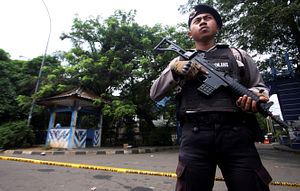If we compile a list of the nationalities of people who have killed the most Australians in terrorist attacks, the country at the top of the list (or near the top) is Indonesia. This is not only the Australian past, it is likely to be the Australian future as well. With Islamic extremism on the rise in Indonesia, and terrorist incidents in 2016 doubling over the previous year in Indonesia, a spike in Australian deaths from Indonesian terrorists is inevitable.
The latest terrorist attack in Indonesia, which killed three policemen on May 27, has been attributed by police to Islamic State. Writing in The Diplomat on June 16, I argued that there will be a follow-on revolutionary Islamic state to take on the mantle of the caliphate after the ISIS organization and forces in Raqqa are “defeated.” U.S. Secretary of State Rex Tillerson suggested as much in his confirmation hearings in January 2017.
The difficult challenge for the Australian government wanting to protect its citizens is that most if not all of the future terrorist attacks by Indonesians on Australia will be on the territory of the northern neighbor, not at home down under. How does a country like Australia, with 25 million people and tiny defense and security forces, deal with this threat coming both from and inside a country of 230 million, the largest Muslim majority country in the world? How does Australia deal with it in an environment where bilateral political relations are suffering occasional emotional rifts and where many Australians have an unjustified fear of peaceful Islamic radicalism?
At an official level, the two countries signed a joint memorandum on counterterrorism cooperation. It is extremely narrow in its focus. It has three sets of activities: intelligence information sharing, further cooperation between law enforcement agencies, and strengthening capabilities through networking, training and education, exchanges (high officials, analysts and field operators), seminars, conferences, and joint operations.
The importance of these activities and the MoU itself cannot be understated, but it is certainly time to question its impact so far and whether it can deal with the emerging challenges. In 2016, in a joint communique, the foreign ministers of the two countries noted success in “counterterrorism cooperation through the Jakarta Center for Law Enforcement Cooperation (JCLEC), including the sharing of intelligence and deradicalization of extremists.”
The Australian government says it is working with Indonesia on countering violent extremism (CVE). That is encouraging but it is also disappointing. The government of Australia has invested almost no money of any scale in that problem and funds negligible academic research on the topic. And there are now “fewer Australian students studying Indonesian at Year 12 level [last year of secondary school] than 40 years ago,” according to Professor Tim Lindsey of Melbourne University, speaking in May 2016.
Australia needs a new strategic approach to countering terrorism in Indonesia. The new strategy has to be focused on containment not defeat. While prevention is an admirable and essential objective of counterterror operations, it is also unachievable at a strategic level in the current geopolitical environment globally and the emerging political climate in Indonesia.
My June 16 article called for a strategy of containment of the Islamic State’s eventual successor without spelling out what that meant. In the context of Southeast Asia, and Australia in particular, such a new containment strategy is essential.
This will mean that Australia and the Southeast Asian Muslim states must recognize radical Islam more openly as a legitimate and inevitable political force and deal with it differently in order to contain its violent extremes. In one sense, this should not be hard. Radicalism is not a crime. It is a fundamental human right, enshrined in the concept of freedom of conscience, the only absolute human right of a political kind. But to take this stance explicitly would be very challenging for any Australian government. It would be to put into words and action President Barack Obama’s indirect refusal to label terrorists as “radical Muslims,” a position Donald Trump and many others find troubling.
The strategy of containment of communism pursued by the United States will not be an exact parallel. Islam is not a secular and atheistic ideology, but a great religion of the world. Moreover, the containment strategy will not be directed at Islam the religion but at the revolutionary states and violent movements that invoke Islam. My policy recommendation and challenge therefore is for governments to recognize and legitimize radical Islam more openly but defend against and contain the multiplying revolutionary and violent groups that act in its name. I would be proud to stand by the side of anti-terror radical Muslims in that fight, even though I know I would share few of their specific beliefs. That diversity and the right to contest it peacefully is what we are jointly defending from the terrorist onslaught.

































